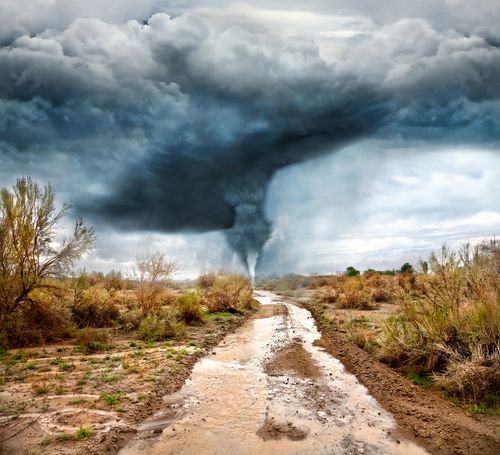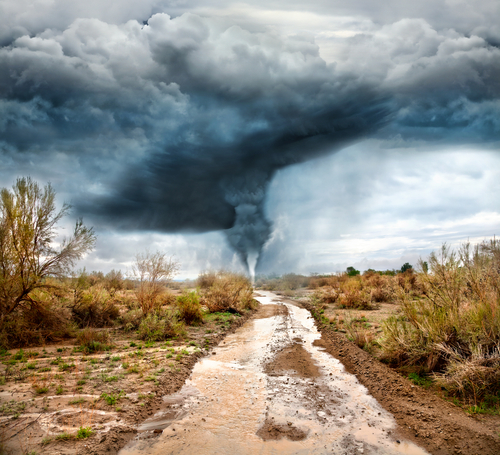
by Erika Anderson
– Lauren Slater’s memoir Lying
When I landed in New York in 2011 after working in Geneva at the UN for three years, I fell back into a sea of words that was uniquely American, a game I had forgotten how to play. I was warned against FOMO (Fear Of Missing Out), told that catching Orlando Bloom’s attention at ABC Kitchen was NBD (No Big Deal), and everything was the best thing ever. I had stepped into a mashup of Friends and Seinfeld, and everything was a punchline. Amid the banter, this thread of suffixes captured my attention:
Feet of snow keep New Yorkers homebound and travelers stranded in December 2010? You must be referring to snowpocalypse.
Windy—anywhere, anytime? You’re bound to find a windpocalypse check-in on Foursquare.
Low-tech email sent to 40,000 NYU students? Say no more: reply-allpocalypse.
Ten-mile stretch of the 405 shuts down in LA? Carmageddon, not just once but twice.
The interminable hours before LeBron James announced his NBA team of choice? Those pins and needles were known as LeBronpocalypse.
Our sitting president supports gay marriage? Watch out, conservatives— Obama launched gaymageddon.
iPhone maps update got you down? The doctor calls that mapocaplypse.
California bans foie gras last July? Hunker down for foie-mageddon.
As much as our ‘–pocalypse’ habit calls to mind the gathering darkness, it is also self-consciously juvenile, always a bit tongue-in-cheek, naming every non-catastrophe with a wink and a nod.
Despite my unfamiliarity with this particular compound-noun phenomenon, I assimilated apocalyptic endings into my vocabulary. While I’m all for straight talk, these seemed to speak to our quotidian anxieties in a socially acceptable way. Still, I felt guilty, knowing that the ghosts of the world’s really apocalyptic wrongs were hovering on the sidelines, unspoken.
When working at the United Nations before my move, we had spoken a different kind of English, at least from 9 to 5: an earnest version free of slang and US-born acronyms, so that our motley crew, comprised of many non-native English speakers, could follow along. For clarity’s sake, we sidestepped the double entendre and meant what we meant, nothing more.
Was our language serious because we were concerned with serious things? Maybe: Our lunch hour was consumed with talk of Tunisia, Egypt and Libya. We abandoned our posts to see Secretary Clinton address the Human Rights Council or to watch President Ahmadinejad emerge from a black Mercedes flanked by Uzi-equipped security guards.
But we are human, and so we also complained about our short-term contracts, the elderly Swiss who admonished us on the street for jay walking, and the ridiculous boy who hadn’t texted back: we just didn’t call these episodes scold-mageddon or date-pocalypse.
Attaching these end-times endings to unpleasant phenomena large and small has shorn the term ‘apocalypse’ of the weight it once had.
This side of the Atlantic, the world I’d left behind tugged at me. In all of the hashtaggable fun, I sometimes wondered, “Where is the weight?” I wondered what happened to the people I used to report on—the IDPs (Internally Displaced Persons) in Yemen, the Senegalese migrants braving the passage to Europe by boat and emboldened by their desperate motto, “Barcelona or die.”
As much as our –pocalypse habit calls to mind the gathering darkness, it is also self-consciously juvenile, always a bit tongue-in-cheek, naming every non-catastrophe with a wink and a nod. Before Sandy hit, we might have called it Frankenstorm—an inspiration for pre-hurricane Halloween costumes—but once it was here and clearly not just a *wink* BFD, but a seriously big fucking deal, the tone changed and the name was dropped.
While I blamed snowpocalypse for shutting me out of New York two Decembers ago, and while I’ve checked into a handful of windpocalypses on Foursquare, I also question my need for this language, and how it is bound together with the collective need. Is it the intensity of living among millions? Is this what social media has done to adulthood? Is this our obsession with youth?
At base, I believe we are always seeking communion. At the UN, we found it through our own common—if stilted—language. Back in the US, perhaps we have found it in this lexicon, a bubble we pretend can protect us from the world; humor is the great neutralizer. Attaching these end-times endings to unpleasant phenomena large and small has shorn the term apocalypse of the weight it once had, making it even less likely that a misunderstood Mayan calendar would incite fear for anyone in this concrete jungle.
Erika Anderson is an online editor for Electric Literature, teaches with the Sackett Street Writers’ Workshop and tweets for the Franklin Park Reading Series. She has an MFA from Vermont College of Fine Arts and lives in Brooklyn.
Bill McKibben: Planetary Emergency
Meaghan Winter: Extinction is the Rule
Joel Kovel and Quincy Saul: Apocalypse and Revelation Are the Same Word
